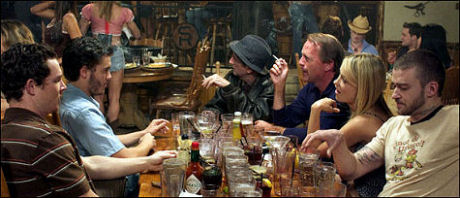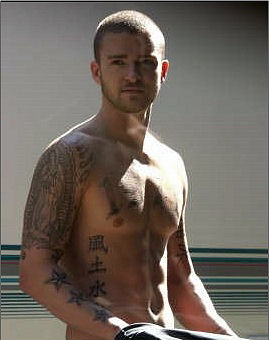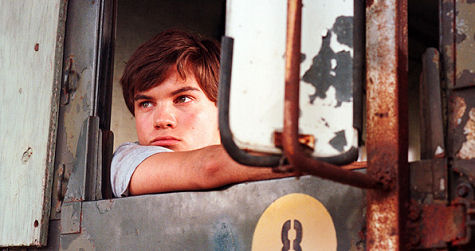It’s been almost two years since I ran a review of Alpha Dog out of the ’05 Sundance Film Festival, so I’m figuring it can’t hurt to re-post with the film finally opening on 1.12, or less than two weeks hence:

Shawn Hatosy, Emile Hirsch, Harry Dean Stanton, Bruce Willis, Olivia Wilde and Justin Timberlake in Alpha Dog.
Directed and written by Nick Cassevettes, Alpha Dog isn’t a great film but it’s quite provocative and even agitating (in a good way). It’s certainly thought-provoking, and it boasts more than a few live-wire performances, including a serious stand-out one by Justin Timberlake
Dog is more than a cautionary tale about amoral kids gone wild. It’s a condemnation of liberal anything-goes values, of absentee parents, of a society lacking in moral fibre. In short, it’s a film that social conservatives will point to and say, “See? This is what we’re trying to prevent.” And it’ll be hard to argue with them.
The impression is that Dog has fashioned its own particular vibe and attitude, but it will certainly be seen as following in the tradition of Tim Hunter‘s River’s Edge, Jacob Aaron Estes‘ Mean Creek and Larry Clark‘s Bully.
The film also stars Shawn Hatosy, Harry Dean Stanton, a bewigged Bruce Willis, Olivia Wilde, Sharon Stone, Dominique Swain and Ben Foster (another provider of an exceptional performance).

Justin Timberlake
Based on a true story that happened about six years ago, Dog is about a 20 year-old known as Jesse James Hollywood (called Johnny Truelove in the movie, and portrayed by Lords of Dogtown‘s Emile Hirsch), a pot dealer from a well-to-do San Fernando Valley suburb who obviously saw himself as a minor-league Tony Montana.
This plus the general lower-end-of-the-gene-pool idiocy that is not unknown to suburban youth culture led to Jimmy making a fatal error: he and some pals kidnapped the 15 year-old younger brother of a guy who owed him $1200 as a way of applying pressure, and when he later realized he and his cronies would be looking at big-time jail terms he told a flunkie to kill the boy (Nicholas Markowitz in actuality– called Zack Mazursky in the film and played by Anton Yelchin) to keep him from testifying.
When the boy’s body was found Jimmy eventually left the country and, with his father’s help, wound up living incognito in Brazil. But last March he was punched by Interpol agents and brought back to the U.S. to face murder charges.
Universal acquired distribution rights from New Line Cinema, which had originally planned to release it on 2.24.06. New Line bailed over a legal tangle regarding a threatened injunction. The beef was from Hollywood’s attorney James Blatt, who’s saying that prosecuting attorney Rod Zonen was guilty of misconduct by providing inside information about the murder case to Cassevetes during the film’s preparation phase. Blatt’s argument was that the release of this information in a dramatic fashion in Alpha Dog would prejudice matters against his client.

Emile Hirsch
Cassevetes was subpoenaed by Blatt in the summer of ’04 as part of an attempt to have Zonen removed from the case for giving Cassavetes access to nonpublic records. The ploy failed. In late ’04 a judge ordered Cassavetes’s researcher, Michael Mehas, who is writing a book about the case, to turn over notes and tapes from his interviews to the defense.
Sundance honcho Geoff Gilmore declared in the ’05 program notes that Cassavetes’ film “captures the driving energy and sordid anomie of contemporary youth culture,” adding that it end “in a tragedy that would be shocking if we weren’t so aware of the kind of world we live in, a place with kids who live without mores, parents who don’t have a clue, and ongoing conflict between the lingering inno- cence of youth and moral disintegration and dissolution.”
A Cassevetes quote in a N.Y. Times piece about absentee-parenting struck home:
“I’m guilty of it — of being too busy with your everyday life to properly spend enough time with your children to figure out what’s going on with them.
“You can check in, and you say, ‘Are you all right?’ But it’s not like being on a farm or spending a lot of time in the house. We all live really global, internetty lives. Kids have more power than they did before. They have cars, they can get around, they have dough, and there’s always some person that’s got something going on that can get everybody killed.”
quet
